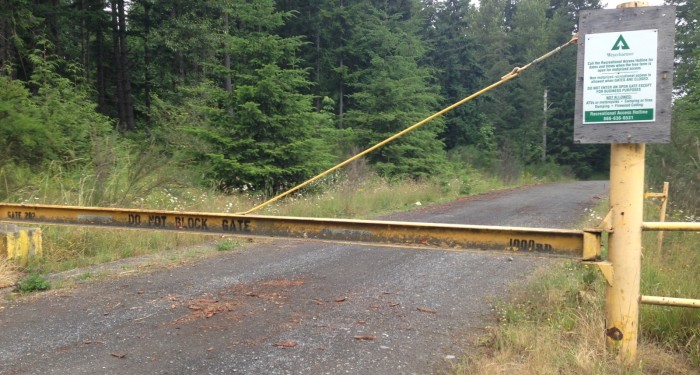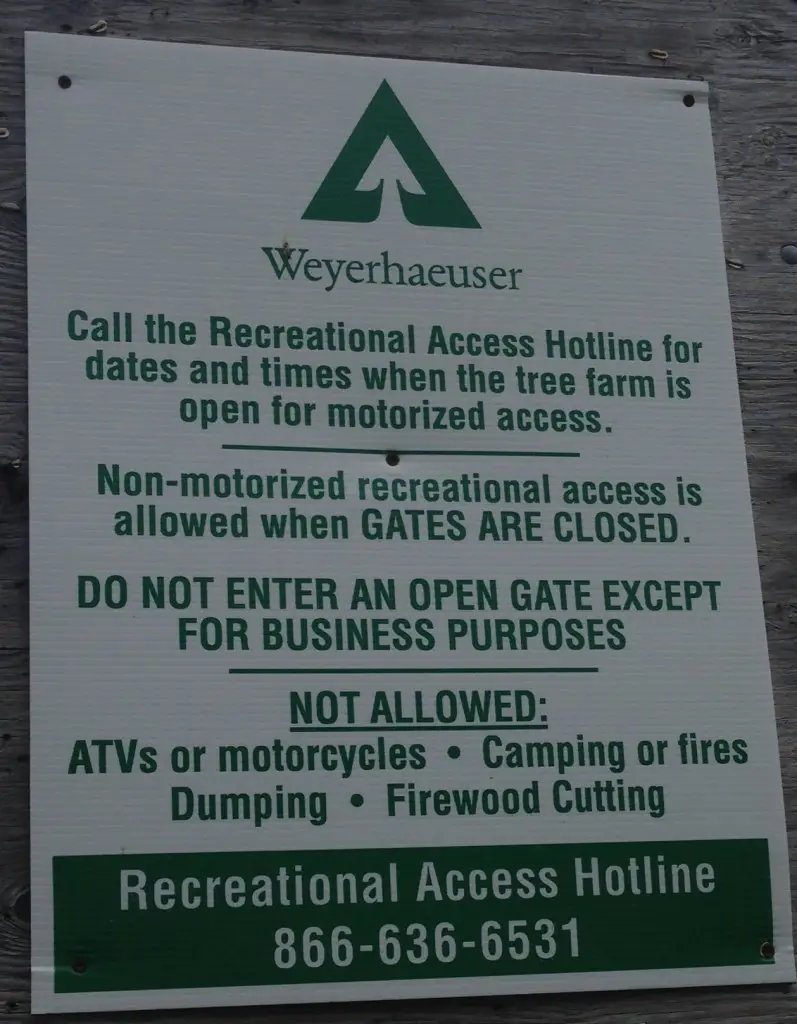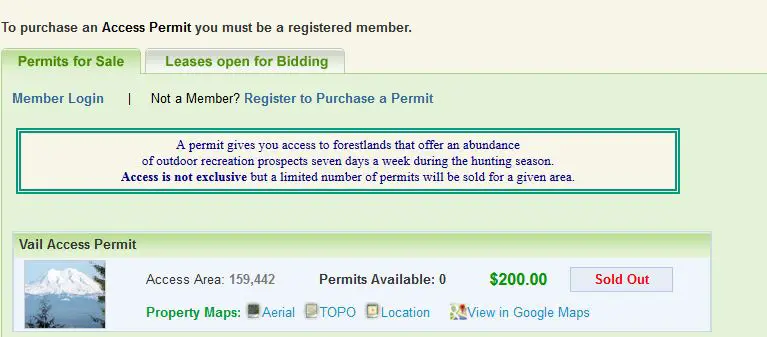Upset about Weyerhaeuser’s controversial access permit program? Continue reading to find out more about Weyerhaeuser Access Permits, along with my proposed solution.
Updated 28 May 2016
Today, I’m writing about a subject that has resulted in much consternation among hunters in western Washington: paying for Weyerhaeuser Access Permits. Weyerhaeuser recently started selling permits and leases on their Vail, Aberdeen, Pell El, and Longview Tree farms. There have been a number of complaints from sportsmen in the area about the system Weyerhaeuser has in place, namely the high cost of the permits and the difficulty associated with obtaining one (specifically a Vail permit). Though this specific issue is playing out in western Washington, the subject of hunting access is one that should concern hunters all over the country.
Full disclosure: I purchased a Vail Tree Farm access permit in 2014. However, I have no connections with Weyerhaeuser other than that. I’m not employed or affiliated with the company in any way. I’m simply a hunter who lives in the Tacoma area who is concerned about the long term implications of the dispute over paying for Weyerhaeuser access permits.
Weyerhaeuser is one of the largest timber companies in the United States and owns or controls over 6 million acres (over 9,300 square miles) of forest. In addition to their tree farms in Washington, they also own or manage timber land in Alabama, Arkansas, Louisiana, Mississippi, North Carolina, Oregon, and Texas. Though their exact policies vary from state to state, Weyerhaeuser offers some sort of public access for recreational purposes for most of their land.
Traditionally, Weyerhaeuser allowed free walk in access for most of the year, and drive in access during specific weekends during hunting season on the 159,000 acre Vail Tree Farm in Thurston, Lewis, and Pierce Counties located in western Washington. Thousands of people visited the tree farm annually to participate in a variety of outdoor activities, including hunting deer, elk, black bear, and various types of small game.
However, they changed their policy during the 2013 season and required the purchase of a $150 access pass to utilize the vast majority of the tree farm during hunting season, which they defined as 1 August to 31 January. Non-motorized access for the rest of the year remained free and did not require a permit. Obviously, hunters were the largest group adversely affected by this policy change.
Weyerhaeuser cited problems with people dumping trash, poaching game, illegally cutting trees and vandalizing equipment as reasons for instituting the access permit system. Additionally, I have no doubt that it cost Weyerhaeuser thousands of dollars to maintain and repair the roads on the Vail Tree Farm due to the additional traffic on them during hunting season. While I never actually witnessed any trash dumping, poaching, or vandalism occurring, there is no doubt in my mind that it was happening on some level. Faced with these issues, Weyerhaeuser decided to go with a “pay for use” program to help reduce the prevalence of the aforementioned problems and offset the costs associated with repairing/cleaning up them up.
In an effort to restrict access to the Vail Tree Farm, Weyerhaeuser only sold 650 access permits in 2013. The demand for them was so high that all permits sold out within 30 minutes. Almost immediately, howls of outrage erupted from the members of the public, particularly hunters, who used to enjoy access to the Vail tree farm, but were unwilling or unable to obtain a permit in 2013. Many hunters who lived near the tree farm and who had hunted there for years suddenly found that they were locked out of their favorite hunting areas.
Regardless of what the public thought, Weyerhaeuser stuck to their new policy and refused to issue any additional permits beyond the original batch of 650. Due in large part to this, the number of hunters who hunted deer in GMU 667, which is where the Vail Tree Farm is primarily located, dropped significantly from 3,473 hunters in 2012 (the last hunting season with free access) to 2,103 in 2013 before increasing slightly to 2,237 in 2014. The total number of deer killed reported by hunters in that GMU dropped from 755 in 2012 to 689 in 2013, but increased to 795 in 2014. Overall hunter success increased from 22% (2012) to 33% (2013) to 36% (2014).
During the same time period, hunters pursuing elk and black bear, which were not nearly as popular to hunt on the Vail Tree Farm as deer, also slightly decreased. The number of elk hunters dropped from 1,083 to 1,071 and the number of bear hunters decreased from 455 to 399. However, the harvest for both animals actually increased slightly from 101 elk in 2012 to 105 in 2013 and 9 bear in 2012 to 14 in 2013. This also resulted in corresponding increases in hunter success rates for both species.
Obviously, this data is imperfect because there are other areas in GMU 667 that were available for hunting by those without a permit besides the Vail Tree Farm. However, it still shows that the restriction of access to Weyerhaeuser land corresponded with an uptick in hunter success in that area. Clearly this meant good things for the fortunate hunters who got an access permit in 2013. The limited number of people who could legally hunt the tree farm generally experienced a more successful season as a result of the low number of permits issued.
Generally speaking, Weyerhaeuser also considered the Vail Tree Farm access permit experiment a success. Since the number of people accessing their land was dramatically curtailed, they very likely experienced fewer problems with garbage dumping, vandalism, etc. As a result, Weyerhaeuser elected to continue to charge for access in 2014, with minor changes to the program. Under the new rules, 800 permits would be sold for the Vail Tree Farm. They increased the price to $200, but allowed motorized access to the majority of tree farm to permit holders.
The Weyerhaeuser access permits for the Vail tree farm for the 2014 hunting season went on sale June 16, and the sale was a complete disaster. The web site opened at 6:00pm, but due to a computer error, nobody was able to actually buy a permit until 6:19pm. Until then, there were thousands of frustrated hunters all over the state of Washington staring at computer screens and continually hitting the “Refresh” button for the web site. When the web site finally started working, all 800 permits sold out in less than 4 minutes.
During the mad rush to buy a permit, there were all sorts of other problems involving people getting kicked off the web site and some getting charged for two permits. One permit covers everyone in an immediate family, including children and grandchildren under the age of 18. However, two adult hunting partners that are not married must each have their own access permit. I know there are some cases where one guy got a permit, but his friend or extended family member did not. In cases like this, the hunters are faced with the choice to either hunt without their partner or not hunt on the Vail Tree Farm at all this year.
Understandably, there is considerable outrage being directed at Weyerhaeuser by sportsmen right now. A lot of people are predicting that since demand for access permits is so high and since Weyerhaeuser is stating that they will not issue more than 800 Vail access permits, Weyerhaeuser will continue to increase the cost of permits until demand drops off.
True to form, in 2015 and 2016, the price of Weyerhaeuser access permits for the Vail tree farm increased yet again to $250 and $300 respectively. Even with the increased price, the 2015 and 2016 Weyerhaeuser access permit sales were over in a matter of minutes due to extremely high demand, similiar to what happened in 2013 and 2014. With the way things are going, it’s not hard for me to imagine $400 (or more) for Weyerhaeuser access permits in the future.
Access to quality hunting area is a problem all over the United States and seems to only be getting worse. Each year, some prospective hunters never really join the sport and many veteran hunters quit because they don’t have access to a good place to hunt. Recreational access permits, like the ones Weyerhaeuser is selling, make for better hunting experiences for those who can afford them. However, these access permits make the problem of finding land to hunt on even more challenging for poor hunters. It seems like that hunting becomes more and more of a rich man’s game as each year passes.
While I’m frustrated about the cost of an access permit, I don’t blame Weyerhaeuser for instituting the new system. I’m sure they were legitimately having a number of problems resulting from public access and this was their way of curbing prohibited activities. The whole point of tree farms is to produce and harvest lumber. Weyerhaeuser is concerned about protecting their most important investment: the trees. Every tree that is cut down without permission, that is used for target practice, or is damaged or defaced in some other way is a loss of money. Damage to equipment and roads also costs time and money to repair and that money has to come from somewhere.
The money they are generating off of permit sales, while a nice benefit, is not the primary reason they are selling access permits. By selling 800 Vail Access Permits at $200 each, Weyerhaeuser generated $160,000 in revenue, or about $1 per acre of the Vail Tree Farm. That’s not chump change, but it is a drop in the bucket to a company which had $7.1 billion in revenue in 2012. That $160,000 was probably spent on administering the access permit program and cleaning up/repairing damage and vandalism done to parts of the Vail Tree Farm by unscrupulous citizens. They may end up making a small profit off the program, but in no way does it offset the absolute thrashing Weyerhaeuser is taking in public opinion right now.
Due to the significant outrage generated by their decision to start selling public access permits, there are proposals afoot in several Washington Counties, particularly in Cowlitz County, to raise property taxes on timber lands owned by Weyerhaeuser. Nobody really knows how this will play out over the long term. However, the company has a lot to lose if they lose some of their tax breaks and things could really get ugly if that happens.
Unfortunately, there is no easy solution to this problem. If one existed, Weyerhaeuser probably would have already done it. As long as the public has access to their land, there will be a small number of people who cause problems by dumping trash, target shooting, vandalizing trees and equipment and generally ruining things for the rest of us.
Any solution to the land access problem must address the problems Weyerhaeuser is facing. For this reason, simply restoring unlimited access is not the answer. Remember, all of the land in question is privately owned and Weyerhaeuser doesn’t have to let anyone use it, no matter how mad the public may get about it. However, selling increasingly expensive and difficult to obtain access permits is not the answer either. If Weyerhaeuser enacts policies that anger enough people for long enough, they are going to suffer the consequences of the inevitable backlash sooner or later. Whether that is in the form of mass boycotts of their products, changing of tax laws unfavorable to the company, or some other, unforeseen event, things could get really ugly for them financially.
There is nothing wrong with requiring that certain types of recreational users purchase an access pass to enter the tree farm. As long as the permit doesn’t cost an excessive amount of money and is not extremely difficult to obtain, most people aren’t going to get bent out of shape about it. At least from where I stand, people aren’t so much upset about having to buy an access permit as they are upset about the cost and the extremely limited number of permits available.
The Inland Empire Paper Company sells access permits for their tree farm near Spokane for $65 per family with no cap on the number sold per year. In addition to recreational access, permit holders can gather up to 5 cords of firewood and cut down a Christmas tree, neither of which are allowed with a Weyerhaeuser permit. A couple of truckloads of firewood and a free Christmas tree pretty much cover the cost of the permit, even if the permit holder does not participate in any other outdoor recreation. It may be because I don’t live in that part of the state, but I haven’t heard much complaining about access permits on IEPCO land.
I understand that the problem set that the Inland Empire Paper Company faces in Eastern Washington is slightly different than the one Weyerhaeuser is dealing with on the other side of the state. For one thing, there are significantly more people looking for access on Weyerhaeuser land. For comparison, approximately 55% of 6.9 million people in the state of Washington live in the Seattle-Tacoma-Olympia area while less than 10% of the population lives in and around Spokane.
Weyerhaeuser cannot keep everyone without a permit out: there are too many people trying to get in and the tree farms are too big. Just for a moment, let’s focus on the Vail Tree Farm and ignore the 650,000+ acres of land encompassed by Weyerhaeuser’s other tree farms in Western Washington. With an area of approximately 159,000 acres, the Vail Tree Farm covers 249 square miles, which is slightly smaller than the island of Molokai in the Hawaiian Islands. Needless to say, this is a tremendous amount of forest and it is extremely difficult to police it effectively. It’s going to cost a whole lot more than the $160,000 generated by selling access permits to prevent people from causing problems on the tree farm.
However, they don’t need to do it all on their own. If Weyerhaeuser has a good relationship with the community, then every person with a recreational permit is provides a set of eyes in the woods. With hundreds or potentially thousands of people on the lookout, it becomes much harder for people to get away with doing prohibited activities. No matter how hard you try to prevent it, there will always be people who cause trouble. The best thing to do is make reasonable efforts to prevent such actions and punish those who do without hurting the 99% of people who are doing the right thing.
Especially if it meant a reward, such as a discount on their access permit, or some other perk, I’ll bet Weyerhaeuser could find a large number of people willing to pick up trash in the woods, or volunteer for some sort of “neighborhood watch.” Making effective use of engaged and motivated volunteers like this would significantly reduce the costs associated with patrolling and cleaning up their tree farms. At the same time, having all those extra eyes in the woods would increase the effectiveness of existing Weyerhaeuser, local police, and game warden patrols on the tree farms.
With these things in mind, here is my proposal:
- No permit is required for motorized or non-motorized transit through Weyerhaeuser land to access any publicly owned land located within the borders of Weyerhaeuser land.
- Weyerhaeuser sells a large (~1,000), number of motorized recreational access permits for their tree farms for a reasonable price, say $50 for an individual and $75 for a family. If demand is still too high, then they should distribute the motorized permits using a lottery system instead of the “first come, first served” system they’ve used the last two years.
- At the same time, Weyerhaeuser institutes and enforces a very strict policy of locking gates at all times, or ensuring that open gates are guarded in some manner. All gates will have some sort of surveillance (even something as simple and inexpensive as a trail camera) to ensure that everyone closes the gate behind them and identify anyone who leaves the gate open, cuts the lock, or bypasses the gate on an ATV. When purchasing a permit, permit holders either receive a key or the combination to the lock on all gates in their area, which change yearly.
- Non-motorized access, to include on bicycles and on horseback, to all Weyerhaeuser land still requires a permit, but there is no limit on the number issued and the fee is either very small ($5-10), or free. The purpose of a fee would be to basically cover the cost of administering the permit system and the costs of maintaining the infrastructure on their tree farms used by the public.
- Everyone utilizing Weyerhaeuser land must have their access permit prominently displayed at all times on their person and on their vehicle (if they have a motorized permit). All permit holders have an obligation to report anyone they observe without a permit displayed. Doing so will result in a reward from Weyerhaeuser in the form of a free or discounted access permit.
- People may also earn free, discounted, or upgraded access permits by volunteering their time for picking up garbage or working as part of a “neighborhood watch” type program on the lookout for illegal or unauthorized activities on Weyerhaeuser land and reporting it to the appropriate authorities.
- All access permit holders will have the opportunity to gather reasonable quantities of firewood, berries, etc. for personal use as long as they do so in a manner that does not damage any living trees.
The simple act of having to register and buy Weyerhaeuser access permits will deter many of the miscreants currently causing problems. At the same time, this policy will still allow regular people access to Weyerhaeuser land at a reasonable cost and access public land for free. Those who are unable to purchase a motorized permit will still have the option to purchase a non-motorized permit and will not lose all access to Weyerhaeuser land. Additionally, the limited number of motorized permits will help keep the number of people driving on the tree farms down to a manageable level. This will reduce the maintenance requirements for the roads on the tree farms, help keep significant portions of the tree farms from becoming a “zoo“ during hunting season, and still preserve the quality of hunting available for motorized permit holders.
Locking and placing surveillance on all gates will do a great deal to prevent people from slipping onto Weyerhaeuser land without a permit. I know that gates are usually left open on the Vail Tree Farm when logging is actively occurring in an area. From many of the grumblings that I hear, it seems like most of the miscreants causing trouble on the tree farm gain access through open gates for the simple reason that they can and the consequences for doing so are so minimal. Ensuring that the gates are always locked will help deter people dumping garbage and vandalizing trees and equipment by simply making it more difficult and time consuming to do so.
Locking the gates will also prevent most unauthorized motorized access, which will also limit the extent of most banned activities to areas closer to the edges of the tree farms. By reducing the area where the banned activities are most likely to occur, this will help make the land easier to police for existing Weyerhaeuser security. Additionally, pursuing legal action against trespassers and vandals may seem like it costs more money than it is worth in the short term. However, if Weyerhaeuser aggressively takes action against those violating the rules, it will not take too long for word to get out and for people to start taking the new rules seriously. After a few people get slapped with fines, or possibly even jail time for serious offenses, Weyerhaeuser will very likely see a sharp decline on the number of incidents that they have to deal with as people realize that it is not worth it to mess around on their land.
No matter what precautions are taken, there are always going to be people that cause trouble. However, if regular people are put in a position where they have an incentive to take ownership of the rules in the tree farms, then they can prove to be a powerful asset. As stated before, it would be prohibitively expensive for Weyerhaeuser to hire enough security to adequately patrol the Vail Tree Farm. However, their existing security would become much more effective if they had 1,000-2,000 “volunteers” on the lookout for suspicious activity while they were in the woods hunting, fishing, or hiking.
Now I’m not an expert on the tax or legal side of things, but it’s my understanding that most timber companies in Washington, including Weyerhaeuser, receive some special tax breaks on their timber land from the state and county governments. Specifically, they pay a reduced tax on land that is not actively being logged, since they are not generating income off that land. I don’t have a problem with this policy in theory. However, I do have a problem with them charging me a lot of money for a permit, then still paying a significantly reduced tax on their land.
Weyerhaeuser can’t have their cake and eat it too. That is their choice if they want to charge large sums of money to the public in exchange for access to their lands. However, they should then lose their special tax breaks based upon the fact that they are receiving income off that land by selling recreational permits. If they want to keep their tax breaks, then they have two choices: provide no access to the public at all or provide access to the public in a reasonable manner.
I do realize that this is an imperfect solution. However, I believe that this is the best, realistic, solution possible for all parties involved. Even though they are still required to obtain Weyerhaeuser access permits, the public continues to receive access to Weyerhaeuser land for hunting, hiking, horseback riding, bird watching, and other recreational activities at a reasonable price. Weyerhaeuser gets better protection for their trees, infrastructure, and equipment on the tree farms, plus a small source of income to offset the costs associated with public access. At the same time, they still get to maintain their preferential tax status for land not being logged and are still (hopefully) maintain an amicable relationship with citizens in the surrounding communities.
What are your thoughts on this?
Enjoy this article discussing Weyerhaeuser Access Permits? Please share it with your friends on Facebook and Twitter.
Make sure you follow The Big Game Hunting Blog on Facebook, Instagram, Twitter, and YouTube.
NEXT: HOW TO FIND PUBLIC LAND YOU CAN HUNT ON
NEXT: BEST GIFTS FOR HUNTERS
John McAdams is a proficient blogger, experienced shooter, and long time hunter who has pursued big game in 8 different countries on 3 separate continents. John graduated from the United States Military Academy at West Point and is a veteran of combat tours with the US Army in Iraq & Afghanistan. In addition to founding and writing for The Big Game Hunting Blog, John has written for outdoor publications like Bear Hunting Magazine, The Texas State Rifle Association newsletter, Texas Wildlife Magazine, & Wide Open Spaces. Learn more about John here, read some of John’s most popular articles, and be sure to subscribe to his show: the Big Game Hunting Podcast.





Hi just purchased the St Helen’s permit for $450. I don’t disagree or agree with the price for the lottery access pass to hunt on their land. I don’t disagree because Weyerhaeuser is letting you hunt on their land, and full access to camping and free wood for a year. They don’t have to let anybody on their land period. If it were our land I wouldn’t let nobody step a foot. I also don’t agree because it has become an amusement park for both hunters and non hunters, and yes there seems to be a reasonable argument that there should be a fee cap, but I’m not sure what price would be fair to cap at. Weyerhaeuser has to make money or what’s the point of letting people on your land? What just to be nice?? That’s a rhetorical question by the way. I hunt Montana elk alot and see farmers or guides charge over $1000 to hunt their farm (regulated or not). So, $450 seems reasonable for me.